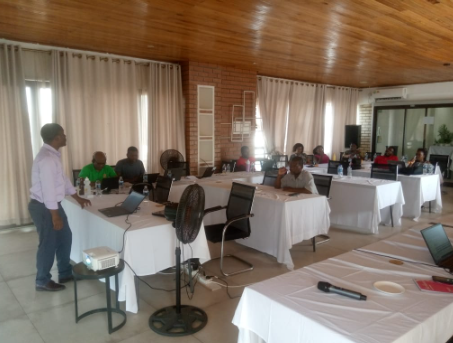
In December, we were invited to the “Global Child Nutrition Foundation Workshop in Mangochi” hosted by the School Health and Nutrition Section. The main objective of this workshop was for partners implementing school feeding programs to come together and review the annual assessment tools of the Global Child Nutrition Foundation, and to fill out these tools for their respective organizations.
Representing Seibo, Victor participated in the workshop and discussed the challenges and content of filling out the tools, as well as deliberated on information gathering and completion.
In addition to the above agenda, Dr. Albert Saka, Deputy Director of School Health and Nutrition, provided a wealth of latest information and led several sessions discussing general practices that all organizations involved should adhere to during implementation.
What was gained from the workshop:
i. Best practices of other organizations in implementing feeding programs
It was recommended to participate in tree planting activities and seek partners or departments that could conduct growth monitoring and health monitoring independently.
ii. Adjustment of programs to meet government and African Union requirements
All participating organizations were strongly encouraged to introduce school feeding based on two types of domestic self-sufficiency.
One is for organizations to purchase food from local farmers in the district, process it, and provide it as meals.
The second is for organizations to introduce agricultural produce to schools, where schools grow food independently every year and provide it as meals to learners.
The bulk procurement and delivery format of school feeding programs like the one currently being implemented by Seibo was discussed as having challenges, such as cost and sustainability concerns if the organization were to withdraw. Seibo was recommended to visit the Rumphi district, where organizations implementing the most sustainable school feeding programs based on locally sourced ingredients are active.
iii. Alignment of monitoring systems with government standards
All participating organizations were strongly urged to prioritize building a good monitoring system that measures progress, tracks implementation, and creates data that can be easily shared with all stakeholders (including the government).
iv. Planning for compliance with government standards in the 2024 budget
In response to the above, Seibo decided to attempt to improve its own program in 2024. Budget adjustments are also planned.
Action plan for the future after the workshop:
(i) Compliance with government-led programs
At the workshop, it was emphasized that school feeding programs are a policy of the Malawi government, and that Seibo is also a partner in this regard. Therefore, all organizations need to follow the instructions and clues from the Malawi government regarding how to implement the program and prioritize.
(ii) Program expansion
Seibo, which has maintained the same number of schools since its inception in Mzimba, was strongly encouraged to expand its program.
(iii) Focus on rural areas
In expanding the program, all participants were advised to prioritize rural areas over urban areas, as the number of students served in one urban school is equivalent to that of five rural schools with higher needs.
(iv) Collaboration with government agencies
Seibo has built partnerships with officials and dignitaries from the School Health and Nutrition Section. This will be useful for visiting government agencies in Lilongwe, the capital, to seek approval for activities such as fundraising and learner biometric data collection software for the 2024 annual action plan and awareness-raising sessions.
(v) Monitoring by qualified personnel
Regarding health status and growth monitoring, it was strongly emphasized that physical measurements of learners should only be performed by qualified medical personnel. Therefore, there was reflection that since Seibo staff do not have qualified medical personnel, measurements of height and weight should never be done independently, and Health Surveillance Assistants (HSAs) should always be involved.
Considering the above benefits, Seibo found participation in this workshop to be very beneficial. Moving forward, we will reinforce the areas that are lacking and further strengthen our feeding support.


